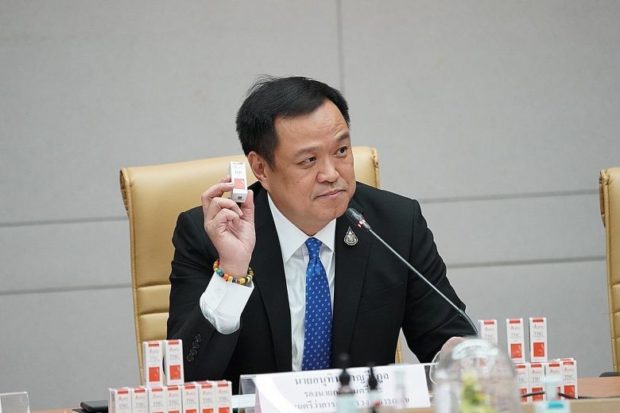Thailand produces 1st batch of cannabis oil

Thai Deputy Prime Minister and Health Minister Anutin Charnvirakul (above) holding up a bottle of cannabis oil at a press briefing yesterday. The first batch of the oil was delivered less than a year after Thailand loosened restrictions on the narcotic last December. ASSOCIATED PRESS, COURTESY OF BHUMJAITHAI PARTY via The Straits Times/Asia News Network
BANGKOK — Thailand’s state-owned drug-maker presented its first batch of cannabis oil to the Health Ministry yesterday as the country readied public hospitals to prescribe the treatment.
A total of 4,500 5ml bottles of cannabis oil were delivered by the Government Pharmaceutical Organisation (GPO), less than a year after Thailand loosened restrictions on the narcotic last December.
“Doctors will diagnose each patient and prescribe each formula to be used,” Deputy Prime Minister and Health Minister Anutin Charnvirakul said at a news conference. “This will not cause harm or addiction if it is used under medical supervision.”
While cannabis, also known as marijuana, is outlawed in many parts of South-east Asia, two of the plant’s key chemical compounds – tetrahydrocannabinol (THC) and cannabidiol (CBD) – have been of particular interest to medical researchers trying to treat cancer, Parkinson’s disease and seizures. THC creates the intoxicating effect which produces a “high”, while cannabidiol is said to reduce seizures.
Cannabis extracts were outlawed in the 1930s, but patients suffering from cancer or seizures continued to produce and use cannabis formulas on the quiet.
Article continues after this advertisementEarlier this year, Thailand’s Food and Drug Administration invited medical cannabis users to declare themselves through a three-month amnesty, later resulting in a register of some 4,000 approved patients.
Article continues after this advertisementThey will be given cannabis-based medicine based on a formula specified by licensed doctors and traditional medical practitioners.
The GPO, which has a cannabis greenhouse, produces oil with THC, CBD and an equal mixture of the two compounds.
Foreigners who are assessed to be eligible under this system will also be prescribed cannabis-based medicine, Mr Anutin told The Straits Times.
As the leader of the Bhumjaithai Party, Mr Anutin had campaigned during the March general election for each household to be allowed to cultivate cannabis in order to reduce the cost of medicine. Given the difficulty of policing these household plots, that pledge may be hard to fulfill.
He told The Straits Times that cannabis could be planted on the compounds of public hospitals to increase supply, allowing it to be tightly supervised. The condition of patients will be closely tracked to aid cannabis research.
The GPO expects to produce 10,000 bottles of cannabis oil by next month, and will also plant a second crop of cannabis to ramp up production in the coming months.
“The more you make, the lower your cost will be, and the more benefit you can bring to the user,” said Mr Anutin. “The long wait of the people has now come to an end.”